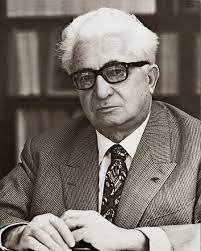Braudel, Fernand

Bio: (1902-1985) French historian. Fernand Braudel is one of the most famous and influential social historians and the main representative of the second generation of the "Annales School". Braudel completed his studies in history at the Sorbonne, and in the period from 1923 to 1935 he taught in high schools in Algeria and France. After that, he taught for two years at the University of Sao Paulo, Brazil, and after returning to France, he became a professor at the École pratique des hautes études. From 1950 to 1972 he was a professor at the Collège de France. From 1946 until his death, Braudel was the editor-in-chief of the very famous magazine Annales (Annals), around which the already mentioned Annales School gathered, and after which the school itself took its name.
The Annals were founded in 1929 by French historians Marc Bloch and Lucien Febvre. This journal, as well as the historiographical current named after him, promoted a view of history that went beyond the study of political events and paid attention to many aspects of social life. On the other hand, the focus was on the history of "long duration", that is, on long-term processes. Braudel continued this intellectual tradition, and theoretically expanded and consolidated it. Braudel's approach was based on the four most important principles. The first concerns the unit of analysis and refers to the necessity of studying what Braudel called the "world economy" (économie monde). The second principle is that multiple social "temporalities" should be studied and especially those of long duration. The third principle refers to the need for an interdisciplinary approach in the social sciences, i.e., removing the boundaries between history and sociology, geography, political science, and economics. The fourth principle refers to the introduction of the distinction between the market and capitalism.
Braudel's term "world economy" does not mean the economy of the entire planet, but refers to the international economic system that has its own economic structure, including the division of labor. This term, in Braudel's great study The Mediterranean and the Mediterranean World in the Age of Philip II, 2 vol. (1972, in French 1949), is used to analyze the economic system of the Mediterranean states in the 16th century. In the same book, Braudel introduces the notion of multiple social temporalities. According to the author, there are three types of temporality: "structure" (which lasts the longest), "cycle" (which are of medium duration), and "events" (shortest duration). The study of structures is paramount in history. Although the structures are quite stable and long-lasting, they go through different economic and demographic cycles, so it is important to study them to better understand specific events. The emphasis on structures and cycles made Braudel's approach more open to other social disciplines, because, without other sciences, it is very difficult to understand structures. To strengthen the interdisciplinary approach in the social sciences, Braudel founded the VIe Section for Social and Economic Sciences at the École pratique des hautes études, as well as the independent research institute Fondation Maison des sciences de l'homme (FMSH), of which he has been a director since 1970 until his death.
In his book Civilization and Capitalism, 3 vol. (1992, in French 1967-1979), Braudel analyzes the relationship between capitalism and the market. In this book, he presents three levels of social life. On the first level everyday life of individuals happens, on the second level are the markets that are always present, and on the third level is capitalism, which, in his opinion, is not inevitable. For Braudel, capitalism functions as an anti-market, because it monopolizes economic life in order to maximize profits and distort the market to suit capitalism. In this way, capitalism dominates and threatens the market and everyday life. Capitalist aspirations to control the market, and market resistance to such tendencies, have shaped the history of the new century. Due to the striving for an interdisciplinary, focus on social and economic history, long-term processes, as well as the international economy, Braudel is considered by many to be the intellectual forerunner of the world systems theory of Immanuel Wallerstein.
Fields of research
Capitalism Civilization Demography Economy Everyday Life Geography History Market Monopoly, Economic Protests Time WorkTheoretical approaches
Annales SchoolMain works
La Méditerranée et le Monde Méditerranéen a l'époque de Philippe II, 3 vols. (1949);
Civilisation matérielle, économie et capitalisme: XVe-XVIIIe siècle, 3. vols. (1967-1979);
Ecrits sur l'Histoire (1969);
La Dynamique du capitalisme (1985);
L'Identité de la France (1986);
Grammaire des civilisations (1987);
A History of Civilizations (1995);
Les mémoires de la Méditerranée (1998);
Out of Italy: Two Centuries of World Domination and Demise (2021).
Works translated into English:
The Mediterranean and the Mediterranean World in the Age of Philip II, 2 vol. (1972, in French 1949);
On History (1980, In French 1969);
The Identity of France, 2 vol. (1988–1990, In French 1986);
Civilization and Capitalism, 3 vol. (1992, in French 1967-1979);
Memory of the Mediterranean (2001, in French 1998).

